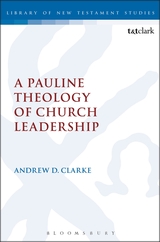Andrew Clarke: A Pauline Theology of Church Leadership
 Andrew D. Clarke, A Pauline Theology of Church Leadership (New York: T & T Clark, 2008), 189 pages, ISBN 9780567045607.
Andrew D. Clarke, A Pauline Theology of Church Leadership (New York: T & T Clark, 2008), 189 pages, ISBN 9780567045607.
This work is important for those considering how best to ‘do church’ and who are also seeking after a Biblical model of leadership. The volume, a theological monograph in the Library of New Testament Studies series, is both theologically up to date and pastorally relevant for today. Clark, a senior lecturer in New Testament Studies in the University of Aberdeen and also the leader of a new church in rural Aberdeenshire, continues and develops the theme of Paul’s understanding of leadership which he addressed in his earlier work, Serve the Community of the Church: Christians as Leaders and Ministers (Eerdmans, 2000). In that work, Clark had noted how Paul’s understanding of Christian leadership should be distinguished from contemporary, social understandings of leadership in the 1st century Graeco-Roman context.
Paul was certainly not an advocate of egalitarian communism, but a believer in levels of authority.

Andrew D. Clarke
Clarke argues that we can only understand Paul’s perspective on leadership and apostolic authority within the ecclesial context in which he worked. That is, a context of house churches where relationship and transparency was integral to the leadership role. He sees the various descriptors—overseer, elder and deacon not as offices, as they would later become in the Ignatian model, but properly as descriptors, often interchangeable or overlapping, of leadership dynamics within the local churches.
For Clarke, the critical ingredients for Pauline leadership were both an ability to teach and an ability to model Christlikeness to others: functions that necessitated relational accountability of such leaders within the local church communities they sought to lead. Clarke see that an attempt to appeal to Paul for models of ministry that vindicate power structures within larger people groups is to remove him from his context.
What did Paul think was necessary to be a good leader? Both an ability to teach and an ability to model Christlikeness to others.
Reviewed by Jim Purves
Category: Ministry, Summer 2010


